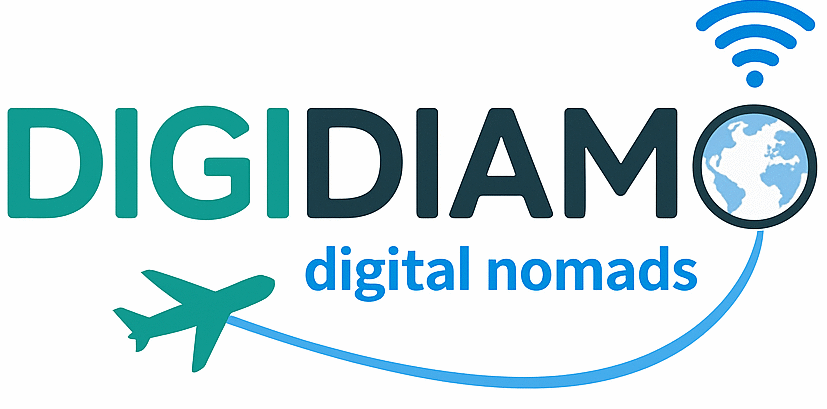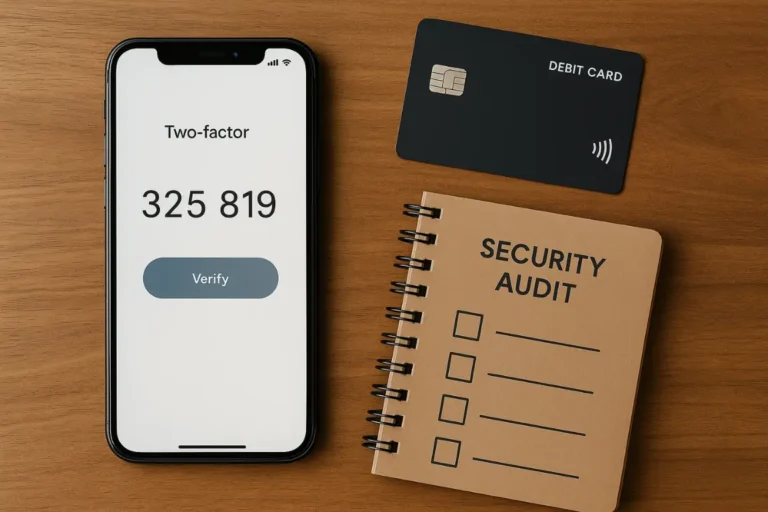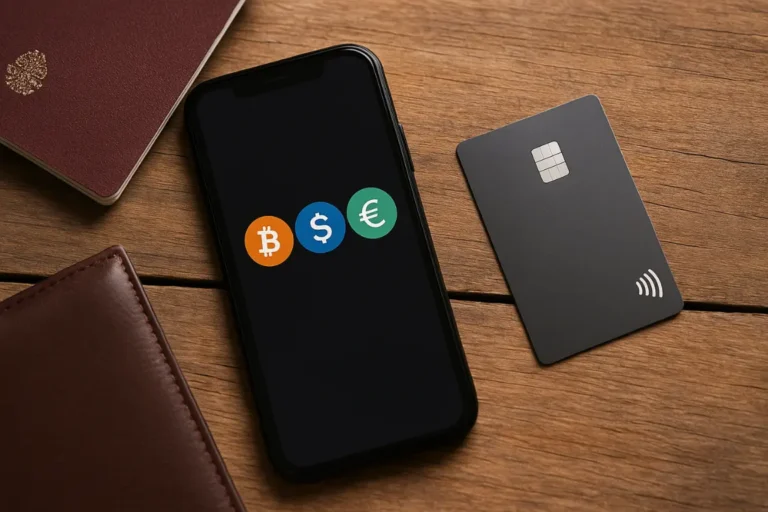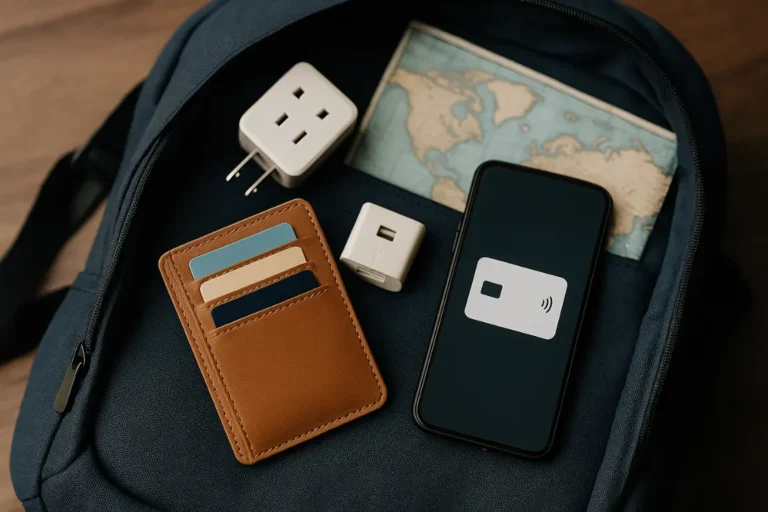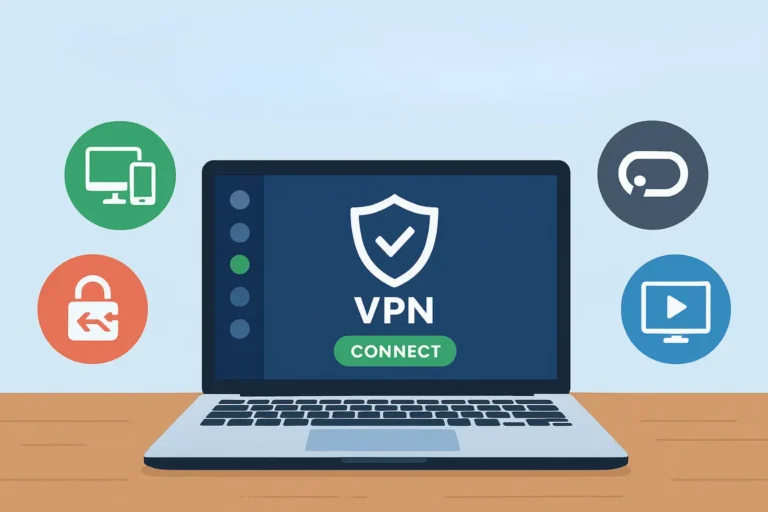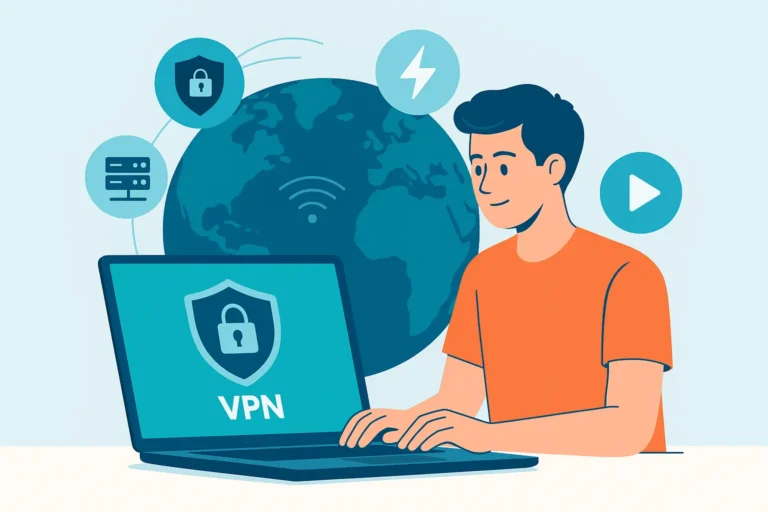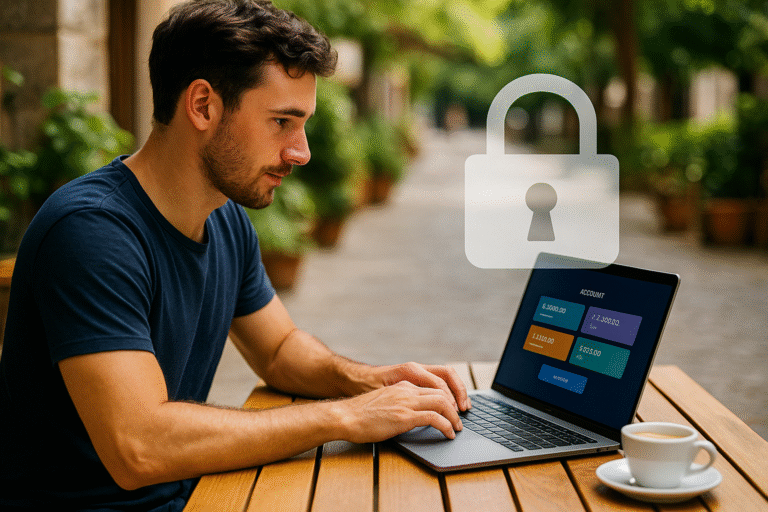Essential VPN features for digital nomads
When I first started traveling and working remotely, I didn’t realize how much I would rely on a VPN. At the beginning, I simply wanted to watch shows from home or check my bank account without getting locked out. Over time I understood that choosing the right VPN features makes the difference between smooth days online and constant frustrations. For digital nomads, a VPN is not just about privacy. It’s about making work and travel seamless. If you want a broader overview of why VPNs are so important, the complete guide on VPNs for digital nomads gives the full context.
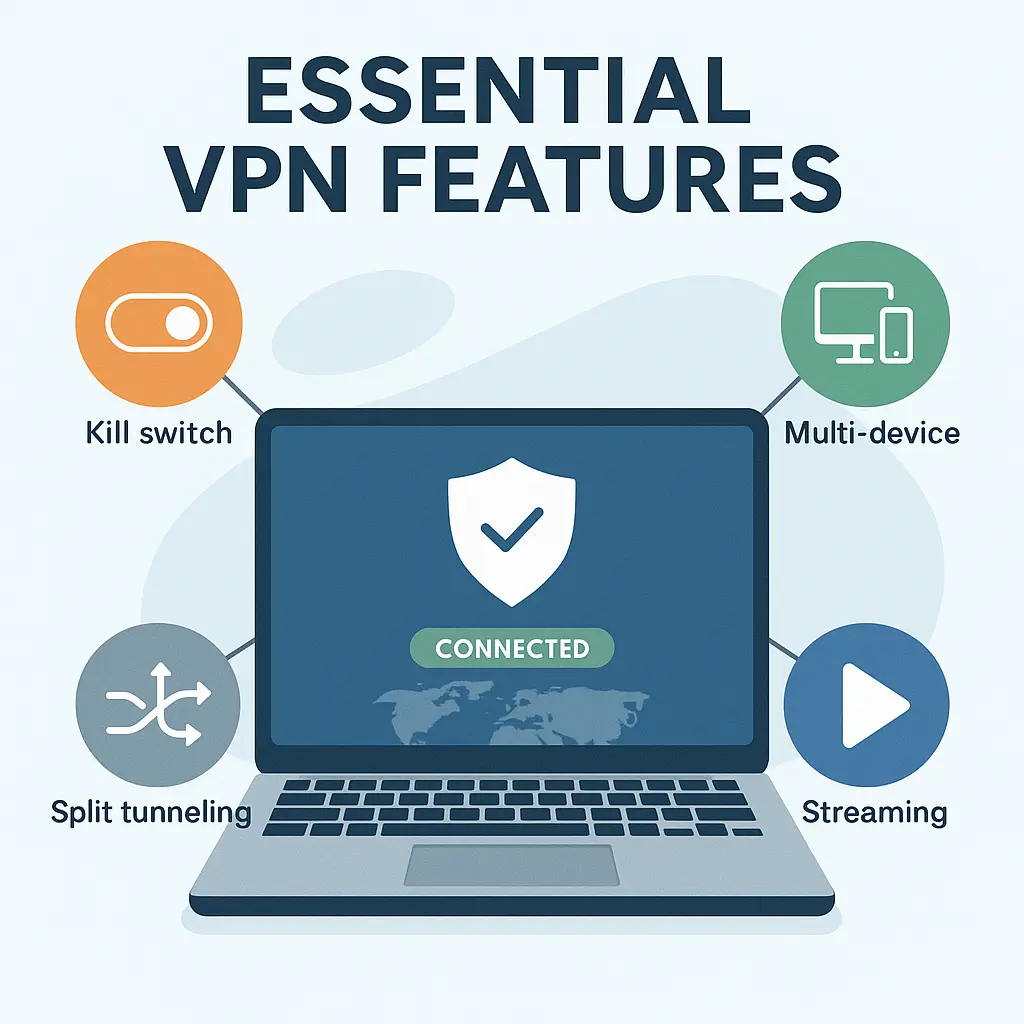
Why features matter for nomads
Every VPN promises security and privacy, but when you’re moving from one country to another those promises get tested. A feature that looks minor in the app description can become essential when you’re sitting in a café with unstable Wi-Fi. For example, I once worked from a hostel in Eastern Europe where the connection dropped several times an hour. A VPN with a kill switch protected my data during each interruption. Without it, my files and passwords could have leaked.
Nomads need VPNs that are built for flexibility, speed, and constant travel. Let’s look at the features that matter most.
Speed and performance
Slow internet can ruin a workday. Add a weak VPN to that and you’ll struggle with frozen video calls and endless loading screens. Good VPNs invest in high-speed servers and modern protocols like WireGuard that keep connections fast without compromising security.
Factors to check:
- Server load: Some apps display how busy each server is. Pick low-load servers for faster speeds.
- Protocol choice: WireGuard and OpenVPN are usually faster than older options.
- Local servers: Connecting to a server geographically close to you usually improves performance.
I once tested NordVPN, Surfshark, and ExpressVPN on the same network. Surfshark gave me the fastest download speed in Asia, while ExpressVPN performed best in Europe. Speed varies by region, so flexibility matters.
Global server coverage
As nomads, we rarely stay in one place. Having a VPN with a wide network of servers is key. More locations mean more chances to access restricted sites, enjoy regional content, and bypass censorship.
Here’s a quick comparison of popular VPNs and their server reach:
| VPN Service | Number of Countries | Good For Nomads Who… |
|---|---|---|
| Surfshark | 100+ | Move frequently between continents |
| ExpressVPN | 105 | Need consistent performance worldwide |
| NordVPN | 60+ | Focus on Europe, North America, Asia |
| ProtonVPN | 65 | Want privacy-focused servers |
If you work with clients in different regions, having a VPN that can make you appear local is also useful. I’ve had situations where payment platforms only worked if I logged in through a home country server.
No-logs policy
Privacy is one of the main reasons for using a VPN. But not all providers truly respect it. A no-logs policy means the VPN does not store your browsing data, IP addresses, or activity. That way, even if someone requests information, there’s nothing to hand over.
Some providers have had their no-logs claims tested in court or through independent audits. These are usually the safest bets. For nomads who use public Wi-Fi daily, trusting that your data isn’t being recorded is critical.
Kill switch
A kill switch sounds technical, but it’s simple. If your VPN disconnects for any reason, the kill switch cuts your internet connection until the VPN is back. Without it, your device would continue online but unprotected.
This has saved me many times. In countries with unstable internet, VPN connections sometimes drop without notice. Thanks to the kill switch, my banking session or client files weren’t suddenly exposed.
Split tunneling
Split tunneling allows you to decide which apps use the VPN and which connect directly to the internet. For example, you might want your banking app secured through the VPN, while your local weather app can use the direct connection for faster results.
For nomads, this balances security with convenience. It also helps when using apps that may block VPN traffic, such as certain local delivery services.
Multi-device support
Most nomads carry more than one device. I usually travel with a laptop, a phone, and sometimes a tablet. A VPN that supports multiple devices on one subscription saves money and simplifies management.
Surfshark is unique here since it offers unlimited device connections. Others like NordVPN or ExpressVPN usually allow 5–6 devices. It’s worth checking before subscribing.
Streaming and content access
Entertainment matters, especially during long stays abroad. But services like Netflix or Disney+ restrict content by region. A VPN with servers optimized for streaming helps you access your favorite shows anywhere.
Some VPNs even label their streaming servers. ExpressVPN, for example, is well known for bypassing tough restrictions. It’s one of the reasons I kept it as my backup, despite its higher price.
Security protocols and encryption
While this sounds technical, it’s the backbone of VPN safety. Good VPNs use AES-256 encryption, the same standard trusted by governments. Combined with modern protocols like WireGuard, this keeps data both secure and fast.
As a nomad, you don’t always control your network environment. You could be in a coworking space, a hotel lobby, or a train with public Wi-Fi. Strong encryption ensures that even if someone intercepts your traffic, it’s unreadable.
Customer support and reliability
Issues always happen at the wrong time. I remember needing urgent access to my bank account from South America, but the server I was using wasn’t working. ExpressVPN’s live chat solved it in minutes.
For nomads across time zones, 24/7 customer support is more than a luxury. It can save your workday.
Free trials and money-back guarantees
A feature often overlooked is flexibility in testing. Most top VPNs provide a 30-day money-back guarantee. This is ideal when you want to test performance in your current region before committing long-term.
ProtonVPN even has a free version, but with limited servers. It’s decent for testing, though I wouldn’t rely on it for daily nomad work.
Balancing price and value
VPN subscriptions vary from $2 to $10 a month, depending on the provider and length of the plan. Features like unlimited devices or premium streaming servers may justify the higher cost. For nomads on a budget, annual plans often offer the best deal.
Here’s a quick look at price vs features:
| VPN Service | Price Range | Unlimited Devices | Streaming Access | Money-Back Guarantee |
|---|---|---|---|---|
| Surfshark | $2–$4 | Yes | Yes | 30 days |
| NordVPN | $3–$5 | No (6 devices) | Yes | 30 days |
| ExpressVPN | $7–$9 | No (5 devices) | Excellent | 30 days |
| ProtonVPN | $0–$10 | No (10 devices) | Limited | 30 days |
Conclusion
A VPN is more than an app on your phone or laptop. For digital nomads, it’s part of the toolkit that makes remote work possible. The right features speed, coverage, no-logs, kill switch, and streaming access make all the difference between frustration and freedom. Every journey brings new challenges, but with the right VPN setup, your online world stays reliable and secure.
If you’re curious to see which providers deliver on these features, check the best VPNs for digital nomads in 2025.
